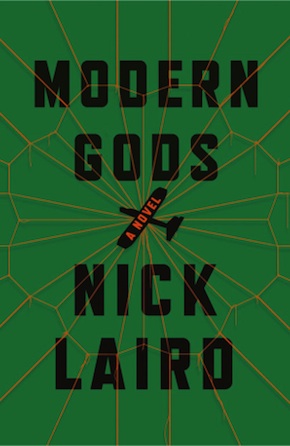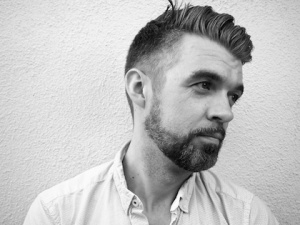Summer at Sheep’s Head
by Nick Laird
“Laird dazzles ear and eye with his kinetic prose.” Jennifer Egan, New York Times
Nick Laird’s latest novel Modern Gods is a provocative tale of two Northern Irish sisters who trying to negotiate unexpected challenges of faith, family, guilt and repentance – both at home and in the depths of a Papua New Guinea rainforest. He answers our quickfire Q&A on a recent London visit.
Where are you now?
In the back of a greentomato cab, coming from Heathrow after flying in this morning from Cork.
Where and when do you do most of your writing?
Fiction in daylight at my desk, either in a library on Washington Square, or in my apartment on Bleecker Street. Poetry at night usually, horizontal as Proust – who I’m about to admit I’ve not read.
If you have one, what is your pre-writing ritual?
Getting rid of my children is my pre-writing ritual. Also, coffee.
Full-time or part-time?
I teach as well.
Pen or keyboard?
Keyboard for fiction. Both for poetry. Usually the poem starts as a snatch of a few words written down, then it’ll be worked out on a computer, and then finally I write it out again by hand. You hear things differently if you use a pen for some reason.
How do you relax when you’re writing?
Are you meant to relax when you’re writing? If the writing’s going well, you’re in a kind of trance where you look up and an hour or two has passed. But usually it’s not going well. I can’t think of any writer that seems ‘relaxed’. Maybe Frank O’Hara.
How would you pitch your latest book in up to 25 words?
I wouldn’t. I’m not selling it. It’s impossible to pitch a story and not sound like that man with the deep voice in the cinema trailers – “Worlds collide when the past comes rushing back and shocking secrets are exposed…” etc. So, no. Sorry.
Who do you write for?
Myself and strangers. I think the book you write is really the book you want to read.
There’s loads of books I love and admire but someone else’s book is someone else’s book. Annoying as my own kids are, I’ve never wished I had someone else’s.”
Who do you share your work in progress with?
My wife. I’ll take her cuts and suggestions on fiction, but tend to refuse them on poems.
Which literary character do you wish you created?
None really. I don’t wish I’d done someone else’s work. And I think writers tend to think of sentences more than characters.
Share with us your favourite line/s of dialogue, poetry or prose.
There’s so many. Lots of Elizabeth Bishop’s lines stick with me. Awful but cheerful. Lots of Shakespeare, Heaney, Dickinson. Here’s three random lines I’ve just put in a poem about beautiful sentences – they’re by Vonnegut, O’Hara, and Hart Crane. You can guess which is whose.
Permit me voyage, love, into your hands.
O you were the best of all my days.
Everything was beautiful and nothing hurt.
Which book do you wish you’d written?
I’ve never really wished that. You just write what you can. There’s loads of books I love and admire but someone else’s book is someone else’s book. Annoying as my own kids are, I’ve never wished I had someone else’s.
Which book/s have you most recently read and enjoyed?
I’m reading Hemingway’s The Sun Also Rises and Austen’s Pride and Prejudice. I know. I hadn’t read either of them before. Turns out they’re pretty good. When I turned 40 I decided I had to read all the classics I’d not read. And I’m re-reading Ulysses. I know this makes me sound like a prick, but I really am. It also turns out Ulysses is much better at 41 than 21, which I was when I first read it at uni. You realise that Stephen Dedalus is an awful rigid prig and that Leopold Bloom is capacious, wonderful, light of mind. Actually, maybe I wish I’d created Bloom.
What’s on your bedside table or e-reader?
See above. I’m staying in West Cork on the Sheep’s Head for the summer and apart from Ulysses, Hemingway, Austen, I have David St John’s Selected to read, Simon Armitage’s The Unaccompanied – which is wonderful so far – and a random cardboard box of books that I found in my basement. Titles include Anatomy of a Southern Protestant, Eating Scenery, and A Place Apart.
Which books do you feel you ought to have read but haven’t yet?
That list is long, and I suspect it’s the usual suspects. Musil’s A Man Without Qualities. Proust (I’ve started him maybe twenty times). Bohumil Hrabal. I never finished Don Quixote.
Which book/s do you treasure the most?
Some signed Heaney editions.
What is the last work you read in translation?
I was re-reading Zbigniew Herbert recently. I read him a lot. In the Carpenter translations.
Which story collections would you particularly recommend?
The Cornet-Player Who Betrayed Ireland by Frank O’Connor. Or anything by Frank O’Connor. Everything That Rises Must Converge by Flannery O’Connor. Or anything by her. Recently, or recent-ish, I liked Wells Towers’ Everything Ravaged, Everything Burned. Josh Ferris’ new collection The Dinner Party is also very good.
What will you read next?
Under the Same Moon: Edward Thomas and the English Lyric by the genius Edna Longley
What are you working on next?
I just sent in a new manuscript of poems called Glitch, that Faber will publish in August 2018, and it needs a bit of revision and re-ordering. This weekend I’m writing poems based on interviews with people who suffered in the Northern Irish troubles for a documentary that’s out in October, I think, and which the people have to say on camera next week. Over the summer I’m working on the first episode of The Dogs in the Street, a show set in mid-Ulster, and working on an adaptation of my wife’s novel Swing Time.
Imagine you’re the host of a literary supper, who would your dinner guests be (living or dead, real or fictional)?
Boringly, I’d want to ask Shakespeare. He must be fed up by now of going to these imaginary dinners.
If you weren’t writing you’d be…?
Wanting to write. Or lawyering. Or doctoring. Or just futering about.
 Nick Laird was born in 1975 in County Tyrone. He has worked as a lawyer in London, and is currently an adjunct professor at Columbia University in New York. His poems, essays and reviews have been published in various anthologies and journals, including the Times Literary Supplement and the London Review of Books. His poetry collections To a Fault, On Purpose and Go Giants are published by Faber and Faber. Modern Gods is out now in hardback. eBook and audio download from Fourth Estate, along with his earlier novels Utterly Monkey and Glover’s Mistake. Read more
Nick Laird was born in 1975 in County Tyrone. He has worked as a lawyer in London, and is currently an adjunct professor at Columbia University in New York. His poems, essays and reviews have been published in various anthologies and journals, including the Times Literary Supplement and the London Review of Books. His poetry collections To a Fault, On Purpose and Go Giants are published by Faber and Faber. Modern Gods is out now in hardback. eBook and audio download from Fourth Estate, along with his earlier novels Utterly Monkey and Glover’s Mistake. Read more
nicklaird.com
@NickLaird
Author portrait © Zadie Smith


